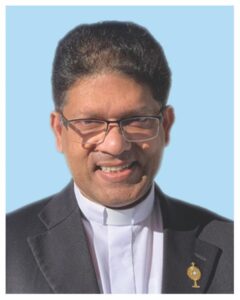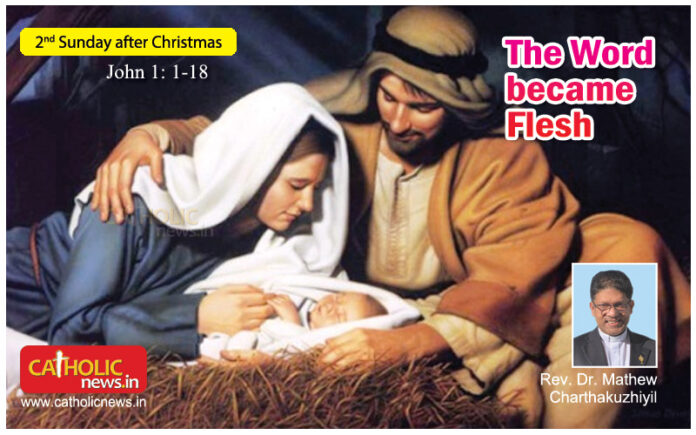
Every year, the Gospel stories of Matthew and Luke draw us back to the manger, reconnecting us with the birth of Jesus. But St. John today invites us to contemplate the deeper mystery of Christ’s birth by connecting it to the beginning of creation. John does not recount the story of the baby Jesus but takes us to the eternal truth of the Word made flesh. John’s prologue begins with these words: “In the beginning was the Word, and the Word was with God, and the Word was God.” In Greek, the word logos is used, meaning “Word.” This Word is not a mere abstract concept but a person – Jesus Christ, the Word of God. Jesus, as the Logos, is the one who brings creation into being and, now, as the incarnate Son of God, brings about a new creation in the world.
The phrase “dwelt among us” is especially meaningful. The Greek word used here literally means “pitched his tent among us.” This phrase recalls the Old Testament when God’s presence dwelt in the Tabernacle as the Israelites journeyed through the wilderness. The Tabernacle was a portable sanctuary, symbolizing God’s presence among his people. In a similar way, the eternal Word took on human flesh and “pitched His tent” among us. Jesus did not remain a distant, untouchable deity but entered into the very fabric of our humanity, becoming one of us. This intimate and profound act is the heart of the Incarnation.
Let me share the story of a man whose life exemplified this love for the Bible. Blessed Zoltán Meszlényi, born on January 2, 1892, in Hungary, was a man deeply devoted to the Word of God. After completing his studies in Rome, he was ordained a priest and later appointed a bishop in 1950. But the political climate in Hungary was harsh, and the communist regime had a deep hostility toward the Church. Twelve days after his consecration, Bishop Meszlényi was arrested. He was tortured and imprisoned, and deprived of warmth and food. Yet, through all the brutality, he never let go of his love for Christ and for the Scriptures.
In the freezing cold, when Bishop Meszlényi saw another prisoner shivering, he gave him his winter coat. He also gave away the Bible he had been holding close to his heart, telling the man that the words in the Bible were in his heart, so it did not matter if someone else read it. This gesture reflected the deep truth that for Meszlényi, the Word of God was more than just a book—it was the source of strength and courage in the face of suffering. Despite the unimaginable hardship, his faith remained unwavering. Bishop Meszlényi died in prison on 4 March 1954, from the effects of torture. He was buried in an unmarked grave, but his remains were later exhumed and transferred to the cathedral in Esztergom. In 2009, he was beatified as a martyr for the faith.
Bishop Meszlényi’s story invites us to reflect on how the Word of God has taken root in our own lives. Jesus, the Word made flesh, continues to dwell among us today. Perhaps He is present to us in the Eucharist, where we encounter Him in a special way. Perhaps His presence is found in the love and care of family and friends, or in the quiet moments of prayer when his light breaks through our darkness. Each of these is a way God pitches his tent among us, bringing his grace and truth to transform our lives. May the Word of God, who became flesh and dwelt among us, continue to dwell in our hearts and guide us on the path of truth and love.
Rev. Dr. Mathew Charthakuzhiyil



